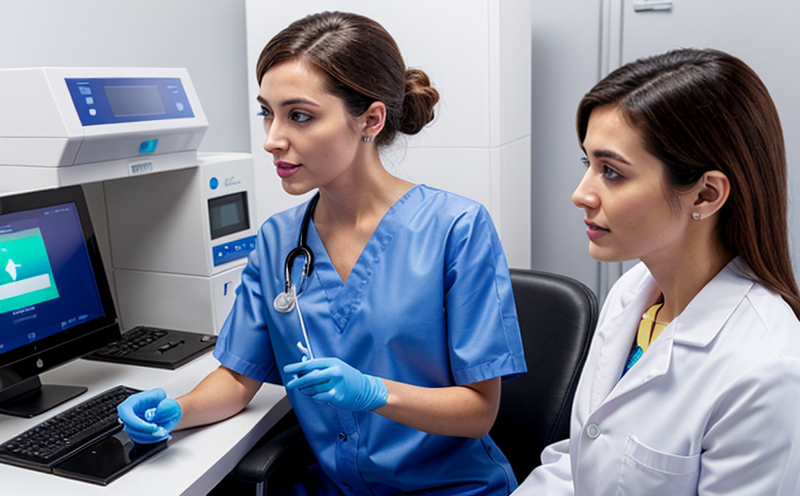PCR Testing for Rift Valley Fever Virus in Veterinary Labs
The Rift Valley Fever (RVF) virus is a zoonotic disease that primarily affects domestic animals, particularly cattle and sheep. It can also cause severe illness in humans. Prompt diagnosis of RVF infection is crucial to prevent outbreaks and mitigate the impact on livestock health and productivity.
In veterinary laboratories, Polymerase Chain Reaction (PCR) testing has become the gold standard for diagnosing RVF due to its high sensitivity and specificity. This method allows for rapid detection of viral nucleic acids from blood samples or other bodily fluids collected from potentially infected animals.
PCR testing involves several key steps: sample collection, transport, RNA extraction, reverse transcription into complementary DNA (cDNA), amplification using primers targeting specific regions of the RVF virus genome, and detection of amplified products via real-time PCR technology. The process ensures accurate identification even in cases where viral loads are low.
Accurate diagnosis through PCR testing plays a vital role in managing RVF outbreaks by enabling timely interventions such as quarantine measures, treatment protocols, and vaccination strategies. By identifying infected animals early, veterinarians can reduce the spread of the virus within herds and minimize economic losses associated with disease-related mortality or reduced milk production.
Moreover, PCR testing supports epidemiological studies aimed at understanding transmission dynamics of RVF among different species and environmental factors that influence its prevalence. These insights are invaluable for developing sustainable control measures tailored to specific geographic regions affected by the virus.
The importance of reliable PCR testing cannot be overstated in safeguarding public health and ensuring robust animal husbandry practices globally. As part of an integrated approach to combating RVF, PCR-based diagnostics contribute significantly towards achieving global goals set forth by organizations like World Organization for Animal Health (OIE) and United Nations Food & Agriculture Organization (FAO).
Recent advancements in next-generation sequencing platforms have further enhanced the accuracy and efficiency of PCR tests used for RVF diagnosis. These technologies enable comprehensive analysis not just of known viral sequences but also discovery of novel variants, providing deeper understanding into genetic mutations responsible for pathogenicity changes over time.
Benefits
- Highly sensitive and specific detection of the RVF virus, ensuring early identification of infected animals.
- Reduces the risk of disease spread by enabling timely isolation and treatment measures.
- Supports effective control strategies through accurate monitoring of infection rates within populations.
- Promotes better resource allocation for containment efforts based on precise data obtained from diagnostic tests.
- Aids in research aimed at improving understanding of RVF epidemiology and identifying potential new therapeutic targets.
Quality and Reliability Assurance
To ensure the highest standards of quality in PCR testing for RVF diagnosis, accredited laboratories adhere to stringent protocols outlined by international bodies such as ISO/IEC 17025:2017. These guidelines emphasize rigorous validation procedures including method comparison studies against reference methods, proficiency testing programs, and continuous staff training.
Accreditation ensures that results generated from these tests are accurate, reproducible, and reliable across different facilities worldwide. This consistency is critical for maintaining confidence in diagnostic outputs which guide crucial decisions regarding animal welfare and public health.
Laboratories must maintain current knowledge about the latest developments in RVF research and promptly incorporate any updates into their testing procedures to stay aligned with evolving scientific understanding of this complex pathogen.
International Acceptance and Recognition
The significance of PCR testing for RVF diagnosis extends beyond national borders due to its widespread adoption across various regions affected by the virus. Many countries rely on internationally recognized standards such as those provided by WHO, FAO, OIE, and CDC when implementing control measures.
Accredited laboratories that perform these tests are often certified under multiple frameworks ensuring their results meet stringent requirements specified by regulatory authorities in diverse geographical areas. Such recognition enhances credibility not only among local stakeholders but also internationally facilitating smoother collaboration during cross-border incidents involving RVF outbreaks.
The harmonization of testing methodologies across jurisdictions fosters consistency in reporting and interpretation, which is essential for coordinated responses to emerging threats posed by zoonotic diseases like RVF. By aligning with global best practices, veterinary laboratories contribute towards building a resilient network capable of swiftly addressing any challenges posed by infectious agents.





